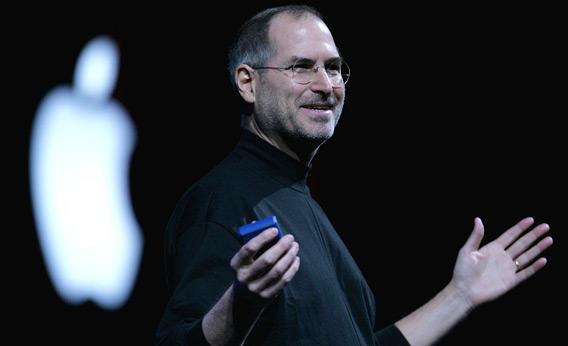Longform.org: Steve Jobs, in His Own Words
Interviews, transcripts, and speeches—the master communicator, unfiltered.

Photo by Getty Images.
Every weekend, Longform.org shares a collection of great stories from its archive with Slate. For daily picks of new and classic nonfiction, check out Longform.org or follow @longformorg on Twitter.
On the week of his passing, the unmistakable voice of Steven P. Jobs throughout his incredible life.
Playboy Interview: Steven Jobs
David Sheff • Playboy • February 1985
A 29-year-old Jobs on the culture that gave birth to Apple:
“Playboy: Why is the computer field dominated by people so young? The average age of Apple employees is 29.
Jobs: It’s often the same with any new, revolutionary thing. People get stuck as they get older. Our minds are sort of electrochemical computers. Your thoughts construct patterns like scaffolding in your mind. You are really etching chemical patterns. In most cases, people get stuck in those patterns, just like grooves in a record, and they never get out of them. It’s a rare person who etches grooves that are other than a specific way of looking at things, a specific way of questioning things. It’s rare that you see an artist in his 30s or 40s able to really contribute something amazing. Of course, there are some people who are innately curious, forever little kids in their awe of life, but they’re rare.”
Steve Jobs: The Next Insanely Great Thing
Gary Wolf • Wired • February 1996
Having departed Apple, a slightly disillusioned Jobs describes his new project, NeXT, and his views on the future of technology:
“Having children really changes your view on these things. We're born, we live for a brief instant, and we die. It's been happening for a long time. Technology is not changing it much—if at all.
These technologies can make life easier, can let us touch people we might not otherwise. You may have a child with a birth defect and be able to get in touch with other parents and support groups, get medical information, the latest experimental drugs. These things can profoundly influence life. I'm not downplaying that. But it's a disservice to constantly put things in this radical new light—that it's going to change everything. Things don't have to change the world to be important.
The Web is going to be very important. Is it going to be a life-changing event for millions of people? No. I mean, maybe. But it's not an assured Yes at this point. And it'll probably creep up on people.”
"You've got to find what you love": Stanford Commencement Address
Steve Jobs • June 2005
Jobs, having been diagnosed with pancreatic cancer, addresses the graduating class of 2005:
“No one wants to die. Even people who want to go to heaven don't want to die to get there. And yet death is the destination we all share. No one has ever escaped it. And that is as it should be, because Death is very likely the single best invention of Life. It is Life's change agent. It clears out the old to make way for the new. Right now the new is you, but someday not too long from now, you will gradually become the old and be cleared away. Sorry to be so dramatic, but it is quite true.
Your time is limited, so don't waste it living someone else's life. Don't be trapped by dogma—which is living with the results of other people's thinking. Don't let the noise of others' opinions drown out your own inner voice. And most important, have the courage to follow your heart and intuition. They somehow already know what you truly want to become. Everything else is secondary.”
Transcript: Bill Gates and Steve Jobs at D5
Kara Swisher and Walt Mossberg • All Things D • August 2011
The legendary rivals meet, in conversation:
“There’s a lot of things that happened that I’m sure I could have done better when I was at Apple the first time and a lot of things that happened after I left that I thought were wrong turns, but it doesn’t matter. It really doesn’t matter and you kind of got to let go of that stuff and we are where we are. So we tend to look forward.
And, you know, one of the things I did when I got back to Apple 10 years ago was I gave the museum to Stanford and all the papers and all the old machines and kind of cleared out the cobwebs and said, let’s stop looking backwards here. It’s all about what happens tomorrow. Because you can’t look back and say, well, gosh, you know, I wish I hadn’t have gotten fired, I wish I was there, I wish this, I wish that. It doesn’t matter. And so let’s go invent tomorrow rather than worrying about what happened yesterday.”
Steve Jobs Was Always Kind to Me (Or, Regrets of an Asshole)
Brian Lam • Wirecutter • October 2011
A former Gizmodo editor at the center of the lost iPhone 4 scandal recalls his relationship with Jobs:
“An hour after the story went live, the phone rang and the number was from Apple HQ. I figured it was someone from the PR team. It was not.
‘Hi, this is Steve. I really want my phone back.’
He wasn't demanding. He was asking. And he was charming and he was funny. I was half-naked, just getting back from surfing, but I managed to keep my shit together.”
For more great technology articles, check out Longform.org’s complete archive.
